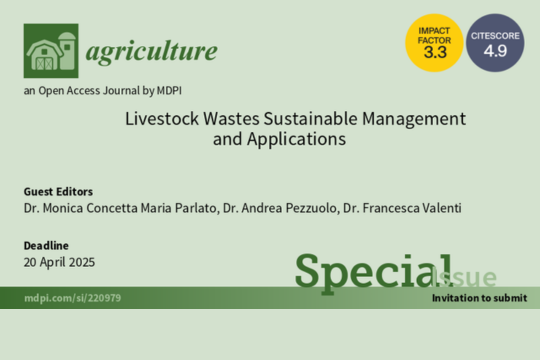Special Issue Information
Livestock waste management is crucial for sustainable agriculture and environmental protection. Handling livestock waste improperly can lead to water, air, and soil pollution, releasing harmful gases such as methane and ammonia and contaminating water sources with pathogens and nutrients. Sustainable livestock waste management focuses on converting waste into valuable resources, such as fertilizers, biogas, and compost. Technologies including anaerobic digestion and composting help reduce the environmental impact by recycling nutrients back into the soil and generating renewable energy. This approach not only mitigates pollution but also supports the circular economy by enhancing soil fertility and reducing dependency on synthetic fertilizers. Sustainable management practices contribute to improving agricultural productivity while minimizing environmental risks. Moreover, certain types of livestock waste, such as animal fibers (e.g., sheep wool, pig hair, etc.), have the potential to be utilized as eco-friendly building materials, offering several significant benefits. Animal fibers could be used as insulation construction materials or as reinforcement for composite materials; they are renewable and biodegradable resources that reduce the environmental impact to a greater degree than synthetic materials.
The papers in this Special Issue explore innovative methods for managing livestock waste biomass sustainably. Topics include efficient waste management, biomass utilization, and circular economy principles. These studies offer key insights into promoting sustainable agriculture and environmental protection. We welcome submissions on the influence of management practices and socioeconomic factors on agricultural waste systems. Areas of interest include reducing livestock waste, optimizing waste handling, valorizing agro-industrial byproducts, and eco-economic assessments of biomass strategies. Both original research and review articles are encouraged.
Research areas may include (but are not limited to) the following:
- Livestock waste management and application;
- Animal fiber valorization;
- Biomass;
- Animal byproducts;
- Livestock waste valorization;
- Bioenergy production;
- Bio resource utilization;
- Circular economy.

